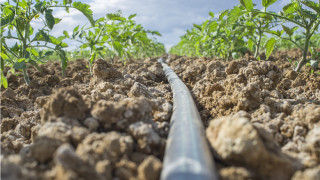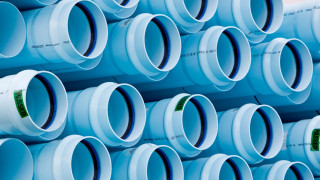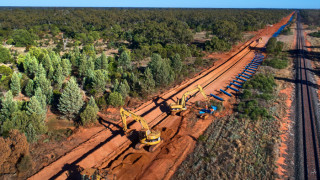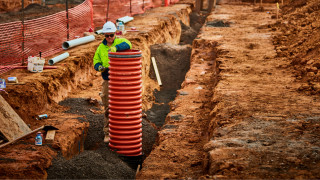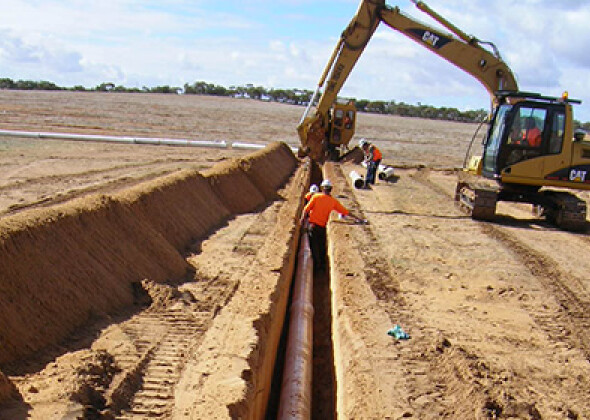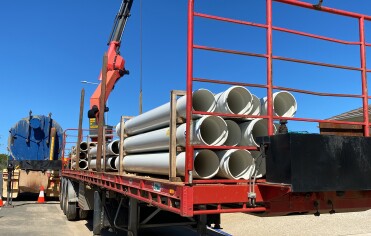PVC-U Pressure Pipe & Fittings (Un-plasticised)
PVC-U pressure pipes and fittings are manufactured from unplasticised polyvinyl chloride polymer (a thermoplastic material) using the extrusion process. PVC-U pipes and fittings were introduced into Australia in the early 1960's and is now widely accepted for use across many applications. Their high strength weight ratio together with exceptional resistance to corrosion or chemical attack make these pipelines ideal for major infrastructure applications.
Filters CLOSE
Our PVC-U Pressure Pipe & Fittings (Un-plasticised) range
Use the filters below to refine your search criteria
Applications
Material Options
Product Details
Handling & Storage
Installation & Testing
FAQ
Case Studies
Applications
Applications
Iplex PVC-U pipes are recognised for their advantages and have been used extensively since the 1970's in the following applications:
- Major potable water supply trunk and reticulation mains
- Irrigation and turf watering systems
- Industrial process pipelines
- Effluent pipelines for pumped sewage, industrial and rural wastes
- Slurry pipelines carrying abrasive and corrosive mine or quarry materials
PVC Pressure Pipe and Fiittings Technical Guide
Advantages
PVC plastic pipe systems offer major advantages over traditional materials including corrosion resistance, installation economics, operating efficiencies and significant reductions in maintenance costs. The following outlines some of the features and benefits of PVC pipes.
| Features | Benefits |
| Excellent internal/external corrosion resistance | Long service life |
| Electrically non conductive | Do not suffer from electrolytic corrosion |
| Rieber rubber ring | Reduced jointing effort and improved reliability |
| Light weight | Ease of handling and reduced laying costs |
Material Options
Material Options
Mechanical Properties
| Property | Value & Unit |
| Density (Specific Gravity) | 1.47 |
| Ultimate Tensile Strength | 52MPa |
| Yield Strain | 5.5% |
| Compressive Strength | 66MPa |
| Tensile Modulus | 3200MPa |
| Hardness Shore D | 85 |
| Poisson's ratio | 0.38 |
| Design Stress | ≤DN150=11.0 MPa >DN150=12.3 MPa |
| Ring Bending Modulus (50yrs) | 1200MPa |
Thermal Properties
| Property | Value & Unit |
| Coefficient of thermal expansion | 70 x 10-6/oC |
| Thermal conductivity | 0.138W/m.k |
| Specific heat | 1045 J/kg/oC |
| Vicat Softening Temperature | >70oC |
| Allowable Operation Temperature | 50oC |
Temperature Effect On Pressure Rating
PVC-U pipes are suitable for service temperatures between 0°C and 50°C. For temperatures above 20°C, provision must be made for pressure re-rating in accordance with the table below:
Thermal re-rating factors*
| Maximum service temperature (°C) | Multiplication factor for pressure re-rating |
| 20 | 1.00 |
| 25 | 0.94 |
| 30 | 0.87 |
| 35 | 0.78 |
| 40 | 0.70 |
| 45 | 0.64 |
| 50 | 0.58 |
*Based on ISO 4422-2 Pipes and fittings made of Un-plasticised Poly Vinyl Chloride (PVC-U) for water supply Part 2: Pipes (with or without integral sockets)
Fire Resistance Properties
| Property | Value & Unit |
| Flammability | Will not support combustion |
| Ignitability-AS 1530* | 7 |
| Smoke Development - AS 1530* | 9 |
| Spread of flame - AS 1530 * | 0 |
| Heat evolved - AS 1530* | 2 |
*AWTA Product Testing, test repot" number 7-558788-CV
Electrical Properties
| Property | Value & Unit |
| Volume resistivity | 1016 ohm.cm (60% RH) |
| Superface resistivity | 1013 - 1014ohm |
| Power factor | 0.015 - 0.020 at 20 0C |
| Dielectric constant | 3.4 - 3.6 at 250C(60 HZ) |
Chemical Resistance
PVC-U pipes have high resistance to a wide range of chemical reagents. Such resistance, however, is a function of temperature, concentration and pressure.
In general, PVC-U is suitable to convey strong acids, alkalis and aqueous solutions (except those which are strongly oxidising), aliphatic hydrocarbons, fluorides, photographic and plating solutions, brine, mineral oils, fats and alcohols. The suitability of a pipeline for conveying a certain chemical will depend on such factors as the concentration of the chemical in the fluid to be conveyed, temperature, flow rate, the presence of pockets or “dead spots” in the pipeline and other factors.
Product Details
Product Details
Standards and Approvals
Iplex PVC-U pipe is manufactured to the Australian Product Standard under a third party accredited Quality Management System (QMS) complying with ISO 9001.
PVC-U pressure pipes has ISO Type 5 third-party StandardsMark™ certification, licence numbers: SMK1304, SMK1058, SMK1173 and SMK1531 in accordance with Australia/New Zealand Standard AS/NZS 1477 “PVC pipes and fittings for pressure applications”.
Rubber Ring Seals
Rubber Ring Seals are EPDM polymer, which conforms to the requirements of AS 1646 “Elastomeric seals for waterwork purposes”.
Colour and Markings
Iplex PVC-U pipes are colour coded in accordance with AS/NZS 1477 and WSAA product specification WSA PS211, to readily distinguish between the different types of pipe applications.
PVC-U pipe colour identification
| Product | Application |
| PVC-U White (Series 1) | Drinking Water |
| PVC-U Purple (Series 1) | Recycled Water |
| PVC-U Cream (Series 1) | Sewerage |
Environmental Credentials
Iplex PVC-U pressure pipe is certified to confirm to the Best Environmental Practice PVC (BEP PVC) provisions of AS/NZS 1260.
The Green Building Council of Australia (GCBA) has defined the standards for best practice environmental performance for PVC manufacturing, against which Iplex’s processes have been audited by an independent certifying body. These permits users of Iplex PVC-U pressures pipes to claim positive PVC Credit Points under the GBCA’s Green Star Rating Scheme Learn More.
Iplex Pipelines has published verified Environmental Product Declaration (EPD) on our range of PVC-U Pressure Pipes. EPD’s are third party certified documents based on ISO 14025 and EN 15804 Standards that communicate transparent and comparable information about the life-cycle environmental impact of a product or service. Specifically, product declarations include information on the environmental impact of raw material acquisition, energy use and efficiency, composition of materials and chemical substances, emissions to air, soil and water and waste generation. View Iplex's PVC-U pressure pipe EPD
PVC-U Pressure Pipe Series 1 Range and Dimensions
PVC-U pressure pipes are available in both Solvent Weld (SWJ) and Rubber Ring Joint (RRJ). DN15 up to and including DN150 pipes are available in SWJ and DN80 up to an including DN375 pipes are available in RRJ.
Series 1 PVC-U (SWJ) Pressure Pipe Dimensions
|
Nominal diameter DN |
Mean outside diameter |
PN4.5 |
PN6 |
PN9 |
PN12(PN15*) |
PN18 |
|||||
|
T |
ID |
T |
ID |
T |
ID |
T |
ID |
T |
ID |
||
| 15 | 21.4 | - | - | - | - | - | - | 1.5* | 18.3* | 1.8 | 17.8 |
| 20 | 26.8 | - | - | - | - | - | - | 1.5 | 23.7 | 2.2 | 22.4 |
| 25 | 33.6 | - | - | - | - | 1.5 | 30.5 | 1.9 | 29.8 | 2.7 | 28.1 |
| 32 | 42.3 | - | - | - | - | 1.9 | 38.5 | 2.4 | 37.5 | 3.4 | 35.4 |
| 40 | 48.3 | - | - | 1.5 | 45.2 | 2.1 | 44.1 | 2.7 | 42.8 | 3.9 | 40.5 |
| 50 | 60.4 | - | - | 1.8 | 56.8 | 2.6 | 55.2 | 3.3 | 53.7 | 4.9 | 50.5 |
| 65 | 75.4 | 1.7 | 72.0 | 2.2 | 71.0 | 3.2 | 68.9 | 4.2 | 67.0 | 6.1 | 63.2 |
| 80 | 88.9 | 2.0 | 84.9 | 2.6 | 83.7 | 3.8 | 81.3 | 4.9 | 79.0 | 7.1 | 74.6 |
| 100 | 114.3 | 2.5 | 109.3 | 3.2 | 107.8 | 4.8 | 104.6 | 6.3 | 101.7 | 9.1 | 96.0 |
| 125 | 140.2 | 3.0 | 134.1 | 4.0 | 132.2 | 5.9 | 128.4 | 7.6 | 124.9 | - | - |
| 150 | 160.3 | 3.4 | 153.4 | 4.5 | 151.3 | 6.7 | 146.9 | 8.8 | 142.7 | 12.8 | 134.7 |
Series 1 PVC-U (RRJ) Pressure Pipe Dimensions
|
Nominal diameter DN |
Mean outside diameter |
PN4.5 |
PN6 |
PN9 |
PN12(PN15*) |
PN18 |
|||||
|
T |
ID |
T |
ID |
T |
ID |
T |
ID |
T |
ID |
||
| 80 | 88.9 | 2.0 | 84.9 | 2.6 | 83.7 | 3.8 | 81.3 | 4.9 | 79.0 | 7.1 | 74.6 |
| 100 | 114.3 | 2.5 | 109.3 | 3.2 | 107.8 | 4.8 | 104.6 | 6.3 | 101.7 | 9.1 | 96.0 |
| 125 | 140.2 | 3.0 | 134.1 | 4.0 | 132.2 | 5.9 | 128.4 | 7.6 | 124.9 | - | - |
| 150 | 160.3 | 3.4 | 153.4 | 4.5 | 151.3 | 6.7 | 146.9 | 8.8 | 142.7 | 12.8 | 134.7 |
| 200 | 225.3 | - | - | 5.7 | 213.8 | 8.4 | 208.5 | 11.1 | 203.1 | 16.2 | 192.9 |
| 225 | 250.4 | 4.8 | 240.8 | 6.3 | 237.7 | 9.3 | 231.7 | 12.3 | 225.8 | 18.0 | 214.4 |
| 250 | 280.4 | - | - | 7.1 | 266.2 | 10.5 | 259.4 | 13.7 | 252.9 | 20.1 | 239.9 |
| 300 | 315.5 | 6.0 | 303.4 | 8.0 | 299.5 | 11.7 | 292.0 | 15.5 | 284.5 | 22.6 | 270.2 |
| 375 | 400.5 | 7.7 | 385.1 | 10.1 | 380.3 | 14.9 | 370.7 | 19.6 | 363.3 | - | - |
PVC-U Fittings Range
A full range of SWJ bends, tees, reducers and valve connectors are available for Iplex PVC-U Series 1 pressure pipes with appropriate socketed joints for sizes DN15 to DN375.
Note: The use of imported solvent welded PVC-U fittings with parallel sockets will require gap filling solvent complying with ASTM D-2564. Failure to use the appropriate solvent and cleaner will result in joint failure.
All PVC-U fittings are electrically non-conductive and do not require corrosion protection in aggressive environments.
PVC-U and Crevet® Ductile Iron Fittings
Conventional socketed fittings complying with AS/NZS 2280 - "Ductile Iron Pressure Pipes and Fittings" are generally suitable for use with Iplex's PVC-U Series 1 pressure pipes.
The Iplex Crevet® range of bends, tees, reducers and flange-spigot pieces are available with rubber ring sockets in sizes DN100 to DN375.
Reference should be made to the Water Services Association of Australia WSAA TN2 'Guidelines for the use of non-metallic pipes with ductile iron elastomeric joint fittings'. If in doubt, contact Iplex Pipelines to confirm the Suitability of any particular range of fittings.
Ductile iron fittings can be protected from corrosion with the following:
- Polymeric coated (preferred)
- Cement lining and polyethylene wrap
- Epoxy coating
Design
The hydraulic capacity of a PVC pipeline can vary due to various factors. View full hydraulic design data, including flow resistance charts, roughness assumptions, and performance considerations for PVC‑U pipelines in the PVC pressure pipe and fittings technical guide.
Handling & Storage
Handling & Storage
Installation & Testing
Installation & Testing
The PVC pressure pipe and fittings technical guide outlines best‑practice methods for installing buried and above‑ground pipelines in accordance with AS/NZS 2032 and AS/NZS 2566.2.
It includes trench geometry requirements, embedment specifications, compaction criteria, socket clearance, backfilling procedures, and commissioning steps such as pressure testing and water‑jet cleaning.
FAQ
Frequently Asked Questions
Case Studies
Other PVC Pressure System products you may like…
Need help?
To speak with an Iplex sales & service team member
